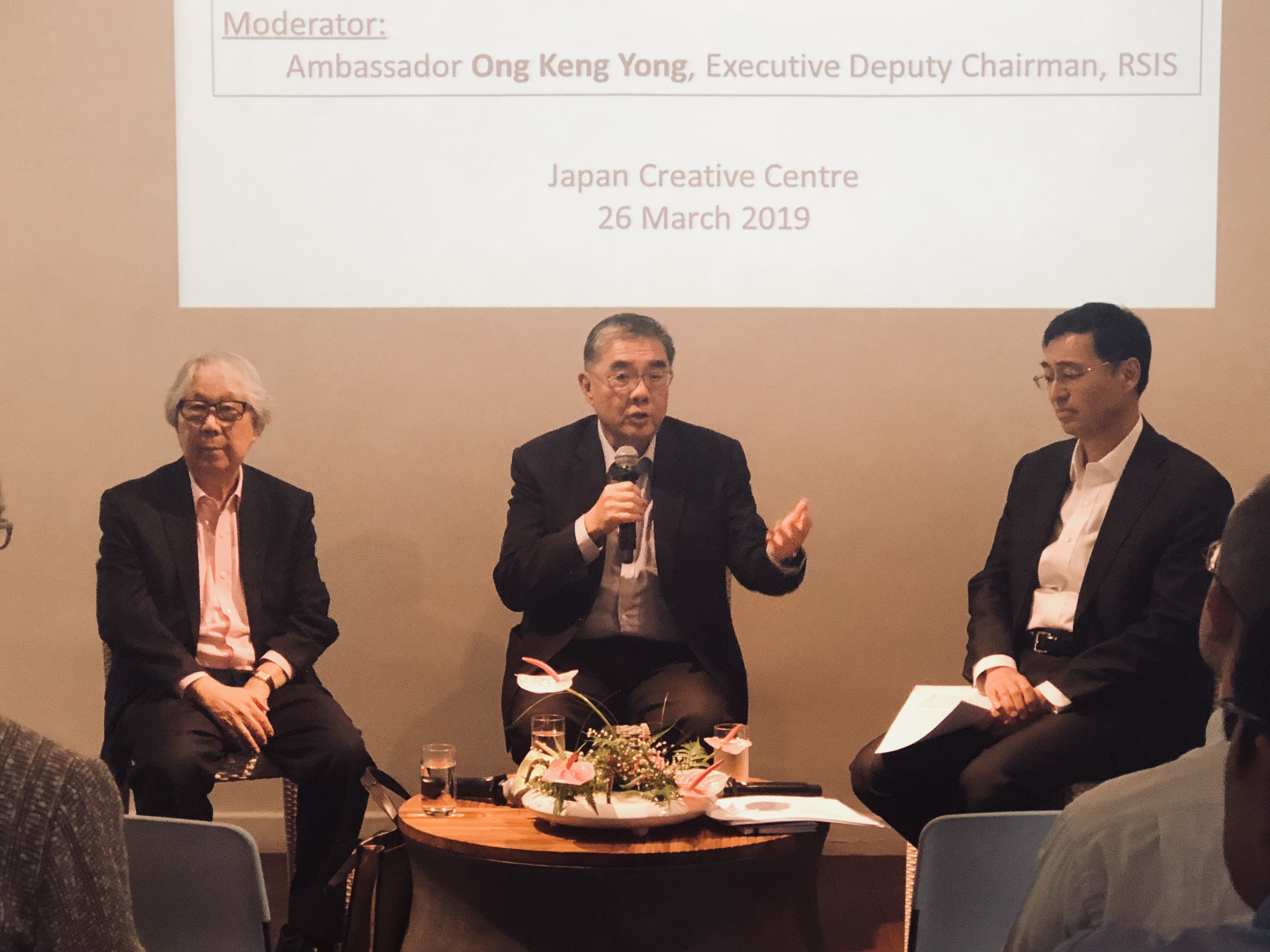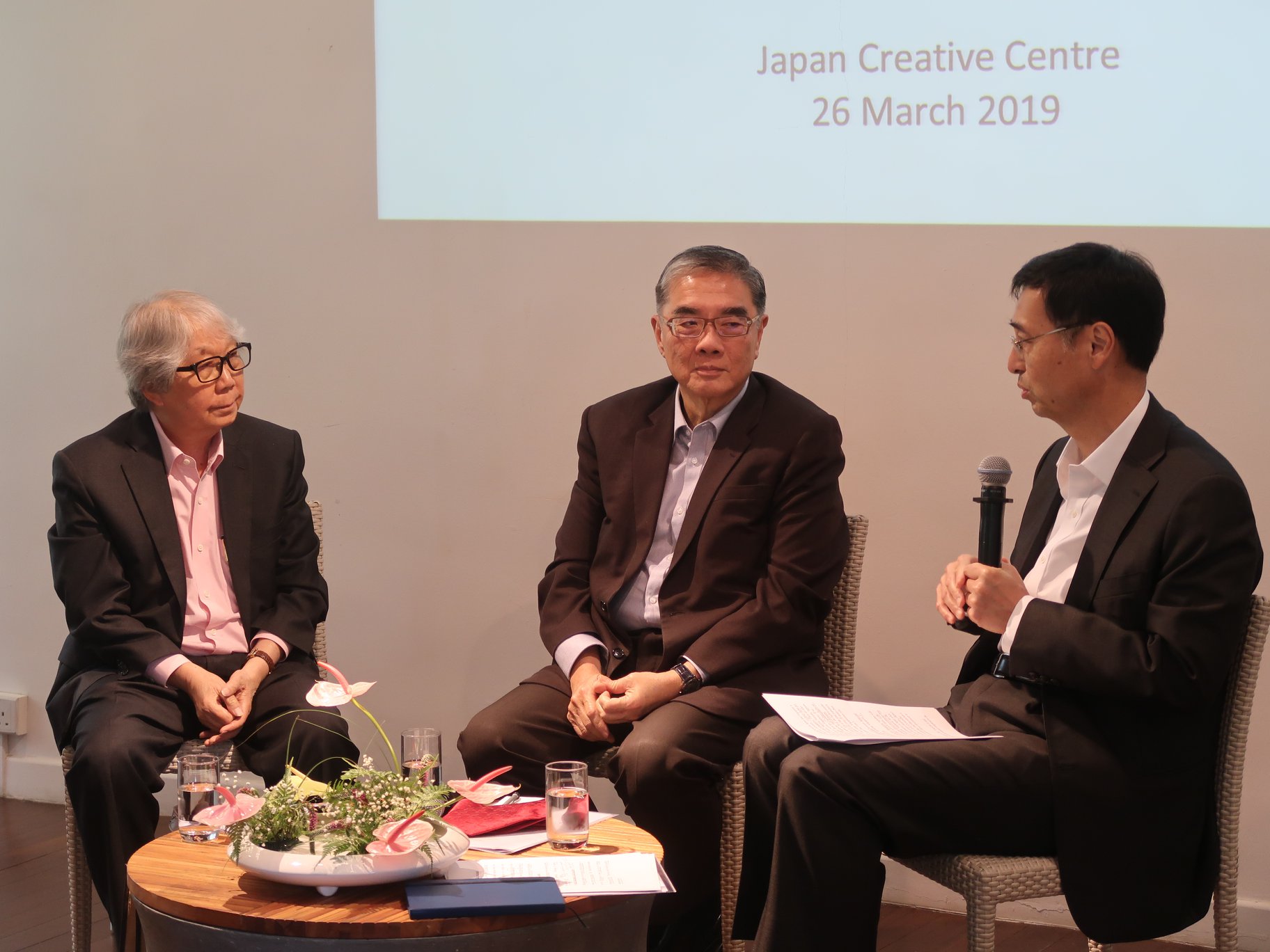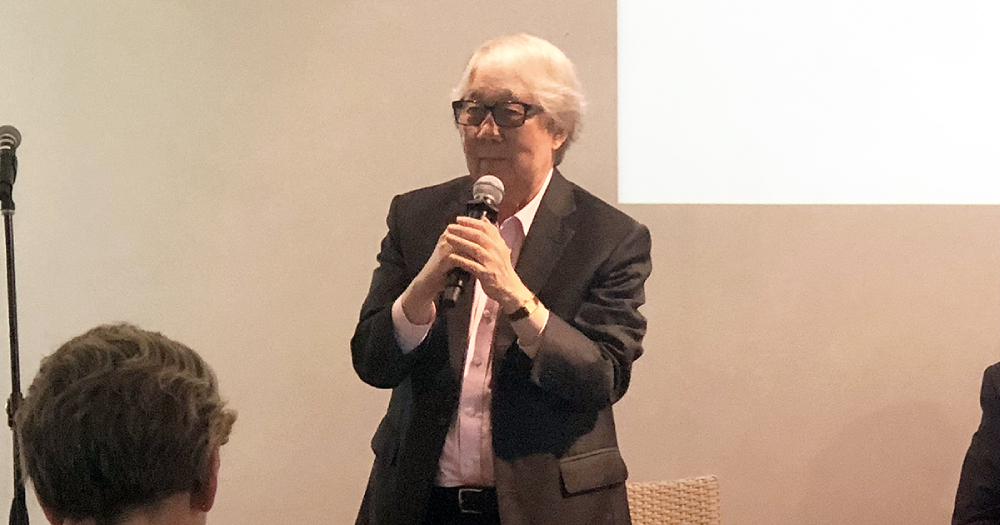Singapore wants to be friends with all the major economies in the world, said Ambassador-at-Large Tommy Koh.
Singapore is a "promiscuous" friend of all
Speaking at a Singapore-Japan dialogue held at the Japan Creative Centre on Tuesday, March 26, Koh said Singapore wants to build relations with all countries, both economically and politically.
He even playfully used the word "promiscuous" to describe a key part of the country's foreign policy strategy.
Koh related an incident in which an "Asean friend" asked him if Singapore is trying to be the 51st state of the United States, while it was trying to negotiate a free trade agreement with the latter.
Koh then jokingly replied in the affirmative, saying that Singapore's ambition is to be "a state of America, a prefecture of Japan, a province of China, a state of India."
He also rejected the view from a member of the audience earlier that Singapore can only choose between China and Japan, and not work with both countries.
Koh added that the situation is "not binary", and that he sees no contradiction in working with both China and Japan.
In an hour-long question-and-answer session moderated by veteran diplomat Ong Keng Yong, Koh engaged in a discussion with Japan's ambassador to Singapore, Jun Yamazaki, on a number of issues, ranging from Singapore's bilateral relations with Japan to the role Japan plays in the region.
 Photo by Kayla Wong
Photo by Kayla Wong
Public figures in the audience included retired diplomat Bilahari Kausikan, who gave his views on Japan and Asean as well.
Here are some of the main highlights from the discussion.
1. Singaporeans love Japan
Ong, in his opening remarks, said that both Singapore and Japan have a strong foundation for their bilateral relation.
He also pointed out that out of every five Singaporeans, three have went to Japan, and one has studied there.
And that has contributed to a positive outlook on the relationship, Ong said.
Koh, who just came back from Japan after attending the 13th Japan-Singapore symposium held in Tokyo on March 19, reiterated this in his speech, saying that "Singaporeans love Japan".
Revealing something personal to himself, Koh said his grandchildren visit the city of Kyoto every year, and that it is their "favourite city in Asia other than Singapore".
And this makes Ambassador Yamazaki's job here in Singapore "very easy", Koh said to the laughter of the audience, which consists of around 50 government officials, academics and members of the media.
Both countries have a "strong, substantive, trouble-free" relationship, are strong economic partners, share a similar strategic vision, and shared values.
Singapore & Japan has a "mature" relationship
In his speech, Yamazaki also pointed out that the respective state leaders from both countries met several times.
For instance, Singapore's Prime Minister Lee Hsien Loong met Japan's Prime Minister Shinzo Abe twice in 2018.
Also, foreign ministers from both sides met four times in the same year, in the months January, February, August and December.
And that is "quite an impressive number", Yamazaki said.
He also mentioned that there are 14 direct flights per day between Tokyo and Singapore.
Drawing laughter from the audience, Yamazaki said he has not even been to the places that Singaporeans told him they have visited.
Such physical connections underlie the "mature relationship" that both countries have with each other.
 Photo via Embassy of Japan in Singapore/Facebook
Photo via Embassy of Japan in Singapore/Facebook
Japan is the most trusted power in Asean
Koh said that as far as Singapore and Asean are concerned, they are not seeking to replace the Chinese market as it is not an option simply because of its sheer size.
But what they are looking to do is to diversify their trading partners, said Koh.
He added that while Japan was Asean's largest investor in the 1960s to the 1980s, it is now the third largest investor and fourth largest trading partner.
So he urged Japan to come back to Southeast Asia, saying that the region is an attractive option for Japan due to the following reasons:
- being half the size of China, it makes for a huge market
- it has a favourable and conducive environment to conduct business
However, the most important reason is that Japan is the most trusted major power in the Southeast Asian region, Koh said, citing a survey done by the ISEAS-Yusof Ishak Institute.
It is, therefore, for this reason, that Koh asked Japan to "please come back to Southeast Asia".
2) Free & open Indo-pacific concept
In response to a question from the audience on what Japan can do in Singapore in view of the "free and open Indo-pacific" (FOIP) concept that was coined by Abe, Yamazaki said Japan wants to make sure that the whole region thrives.
And already, he has seen cooperation take place on the ground in the form of businesses.
Koh gave his take on the FOIP concept as well, saying that his Singaporean colleagues asked a number of pertinent questions at a meeting in Jakarta recently.
For instance, they asked:
- What is the comparative benefit of the terms "Asia-Pacific" and "Indo-Pacific"?
- Why is the "Quad" (Japan, Australia, India and the U.S.) abandoning the concept of "Asia-Pacific" in favour of "Indo-Pacific"?
- Is the "Indo-Pacific" inclusive?
- Will Asean be in the centre of this concept?
- What tangible benefits can FOIP bring to the region?
Indonesia's agenda when it comes to "Indo-Pacific" concept?
Koh also added that Indonesia does not have an ideological agenda towards the concept, and that they view the concept as purely regional since the country sits in both the Indian and Pacific oceans.
This is why the country does not call it the FOIP, whereas the "Quad" does.
However, Ong disagreed with Koh, saying that Indonesia does have an ideological agenda when it comes to the "Indo-Pacific" concept, and that agenda is to keep strong Indonesian characteristics in whatever regional architecture they have at the moment.
This refers to their stance of non-alignment by keeping the big powers out and not letting any external powers influence their foreign policy.
Should a major power, such as the U.S., be allowed to project its influence in the region, this means the Chinese will have to react, which might in turn force Asean to take sides.
And that will not bode well for regional stability.
Therefore, Indonesia has a serious agenda in making sure the FOIP concept will not open the ground to division and contention in Asean, Ong said.
3) Asean more successful than people give it credit for
Koh said Singapore's "first loyalty is to Asean", and this is why Singapore attaches so much importance to Asean unity and Asean economic integration.
And Asean is a priority that comes before building good relations with all major powers, although the latter is second most important on Singapore's priorities.
However, Koh said Asean "does not enjoy good press", even though the grouping is more successful than people give them credit for.
And one area that Asean has done well in is propagating the idea that countries in the region should collaborate with one another.
Not only has that been done successfully in Asean, such a spirit has also been spread to Northeast Asia, Koh said.
He said Asean is the "catalyst that brought Japan, (South) Korea and China together", which led to the three countries exploring the idea of a trilateral free trade agreement, although the idea is delayed due to political differences at the moment.
Japan can help boost Asean's morale
Bilahari, whom Koh said at the start of the session was "knowledgeable" on Japan, gave his views on the perception of Asean as well.
He said it is not just the media and scholars, but also dialogue partners of Asean, and even some Asean members themselves, who are losing faith in the grouping.
He then talked about a bit of Asean's history, saying that while nothing much happened in the first few decades after Asean was formed in the 1960s, things changed when then-Japanese Prime Minister Takeo Fukuda announced the Fukuda Doctrine in August, 1977.
It made the major powers take Asean seriously for the first time.
They then proceeded to structure their approach to Southeast Asia with Asean at the centre, although the term "Asean centrality" was not used then.
Bilahari said:
"It was an act of faith, some would say it was an act of reckless folly."
He ended his comments by saying Japan can continue to "keep the faith" and play the role in invigorating Asean's morale now.
If you like what you read, follow us on Facebook, Instagram, Twitter and Telegram to get the latest updates.
